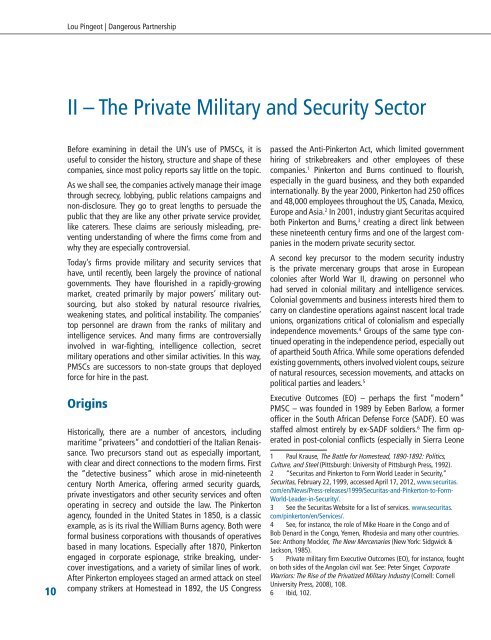Dangerous Partnership - Global Policy Forum
Dangerous Partnership - Global Policy Forum
Dangerous Partnership - Global Policy Forum
Create successful ePaper yourself
Turn your PDF publications into a flip-book with our unique Google optimized e-Paper software.
Lou Pingeot | <strong>Dangerous</strong> <strong>Partnership</strong><br />
II – The Private Military and Security Sector<br />
10<br />
Before examining in detail the UN’s use of PMSCs, it is<br />
useful to consider the history, structure and shape of these<br />
companies, since most policy reports say little on the topic.<br />
As we shall see, the companies actively manage their image<br />
through secrecy, lobbying, public relations campaigns and<br />
non-disclosure. They go to great lengths to persuade the<br />
public that they are like any other private service provider,<br />
like caterers. These claims are seriously misleading, preventing<br />
understanding of where the firms come from and<br />
why they are especially controversial.<br />
Today’s firms provide military and security services that<br />
have, until recently, been largely the province of national<br />
governments. They have flourished in a rapidly-growing<br />
market, created primarily by major powers’ military outsourcing,<br />
but also stoked by natural resource rivalries,<br />
weakening states, and political instability. The companies’<br />
top personnel are drawn from the ranks of military and<br />
intelligence services. And many firms are controversially<br />
involved in war-fighting, intelligence collection, secret<br />
military operations and other similar activities. In this way,<br />
PMSCs are successors to non-state groups that deployed<br />
force for hire in the past.<br />
Origins<br />
Historically, there are a number of ancestors, including<br />
maritime “privateers” and condottieri of the Italian Renaissance.<br />
Two precursors stand out as especially important,<br />
with clear and direct connections to the modern firms. First<br />
the “detective business” which arose in mid-nineteenth<br />
century North America, offering armed security guards,<br />
private investigators and other security services and often<br />
operating in secrecy and outside the law. The Pinkerton<br />
agency, founded in the United States in 1850, is a classic<br />
example, as is its rival the William Burns agency. Both were<br />
formal business corporations with thousands of operatives<br />
based in many locations. Especially after 1870, Pinkerton<br />
engaged in corporate espionage, strike breaking, undercover<br />
investigations, and a variety of similar lines of work.<br />
After Pinkerton employees staged an armed attack on steel<br />
company strikers at Homestead in 1892, the US Congress<br />
passed the Anti-Pinkerton Act, which limited government<br />
hiring of strikebreakers and other employees of these<br />
companies. 1 Pinkerton and Burns continued to flourish,<br />
especially in the guard business, and they both expanded<br />
internationally. By the year 2000, Pinkerton had 250 offices<br />
and 48,000 employees throughout the US, Canada, Mexico,<br />
Europe and Asia. 2 In 2001, industry giant Securitas acquired<br />
both Pinkerton and Burns, 3 creating a direct link between<br />
these nineteenth century firms and one of the largest companies<br />
in the modern private security sector.<br />
A second key precursor to the modern security industry<br />
is the private mercenary groups that arose in European<br />
colonies after World War II, drawing on personnel who<br />
had served in colonial military and intelligence services.<br />
Colonial governments and business interests hired them to<br />
carry on clandestine operations against nascent local trade<br />
unions, organizations critical of colonialism and especially<br />
independence movements. 4 Groups of the same type continued<br />
operating in the independence period, especially out<br />
of apartheid South Africa. While some operations defended<br />
existing governments, others involved violent coups, seizure<br />
of natural resources, secession movements, and attacks on<br />
political parties and leaders. 5<br />
Executive Outcomes (EO) – perhaps the first “modern”<br />
PMSC – was founded in 1989 by Eeben Barlow, a former<br />
officer in the South African Defense Force (SADF). EO was<br />
staffed almost entirely by ex-SADF soldiers. 6 The firm operated<br />
in post-colonial conflicts (especially in Sierra Leone<br />
1 Paul Krause, The Battle for Homestead, 1890-1892: Politics,<br />
Culture, and Steel (Pittsburgh: University of Pittsburgh Press, 1992).<br />
2 “Securitas and Pinkerton to Form World Leader in Security,”<br />
Securitas, February 22, 1999, accessed April 17, 2012, www.securitas.<br />
com/en/News/Press-releases/1999/Securitas-and-Pinkerton-to-Form-<br />
World-Leader-in-Security/.<br />
3 See the Securitas Website for a list of services. www.securitas.<br />
com/pinkerton/en/Services/.<br />
4 See, for instance, the role of Mike Hoare in the Congo and of<br />
Bob Denard in the Congo, Yemen, Rhodesia and many other countries.<br />
See: Anthony Mockler, The New Mercenaries (New York: Sidgwick &<br />
Jackson, 1985).<br />
5 Private military firm Executive Outcomes (EO), for instance, fought<br />
on both sides of the Angolan civil war. See: Peter Singer, Corporate<br />
Warriors: The Rise of the Privatized Military Industry (Cornell: Cornell<br />
University Press, 2008), 108.<br />
6 Ibid, 102.


